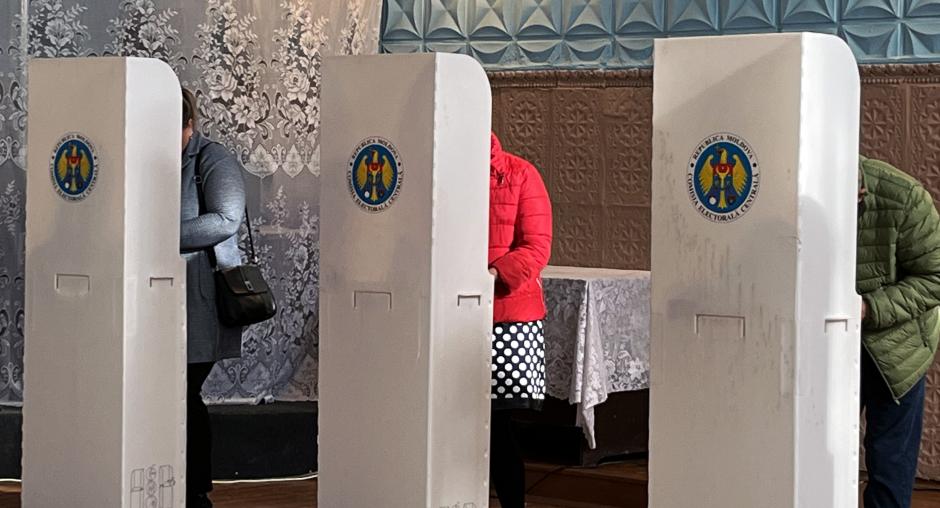Moldova’s elections peaceful and efficient, but marred by sweeping restrictive measures amid national security concerns: international observers

CHIŞINĂU, 6 November 2023 – Moldova’s local elections were calm and efficiently managed with candidates mostly able to campaign freely, but the broad powers of the government commission for exceptional situations were used to restrict freedom of speech and association as well as the right to stand, while interference from abroad and widespread allegations of vote buying throughout the campaign were of concern, international observers said in a statement today.
The joint observation mission from the OSCE Office for Democratic Institutions and Human Rights (ODIHR), the Council of Europe Congress of Local and Regional Authorities (the Congress), and the European Parliament (EP) concluded that the legal framework forms an adequate basis for holding democratic elections. The new electoral code, which implements many previous ODIHR and Congress recommendations, was adopted following comprehensive consultations that included civil society organizations, but regrettably lacked the participation of the parliamentary opposition.
“The elections were run well under challenging circumstances,” said Corien Jonker, head of the ODIHR election observation mission. “But while the authorities deserve praise for the new electoral code, we were concerned to see the extensive use of executive powers during the ongoing state of emergency to introduce a last-minute ban of multiple candidates, as well as blocks on numerous media outlets.”
Yesterday’s elections were held amidst tensions over the country’s geopolitical orientation and under a state of emergency declared in February 2022 on the grounds of threats to national security. Legal changes made in October preventing candidates associated with a party dissolved earlier in the year from running in the election remain questionable, especially for candidates suspected but not prosecuted and convicted of any crime. Less than 48 hours before polling stations opened, a blanket ban was imposed on all 8,605 candidates nominated by one party, contrary to commitments made by all OSCE states as well as other international standards for democratic elections.
“We welcome the revision of the Electoral Code which closed some previous legal loopholes and addressed past recommendations notably on campaign finance, independent candidates and gender quotas,” said Vladimir Prebilić, deputy head of the Congress delegation. “But while we welcome the pro-active efforts of the authorities to address electoral corruption, a new approach is needed if the state of emergency is extended again, with specific attention given to the timing and application of restrictions. We also call for a re-examination of the wide-ranging powers granted to the Commission for Exceptional Situations. For Moldova’s democratic reforms to progress, these issues require an urgent response both in the legal framework and in practice. We look forward to ongoing political dialogue with the Moldovan authorities to act on these recommendations.”
Observers noted credible, persistent and widespread allegations of the use of illegal funds for vote buying, linked to the leader of the dissolved Şor Party, as well as the use of foreign private sponsorship to fund local infrastructure projects in some districts. Salary increases for public servants and one-time bonuses for teachers and police introduced by the parliament, as well as campaigning by the prime minister while carrying out official duties, blurred the line between party and state.
Most members of the national election authority are nominated by the ruling party, which compromises its impartiality. However, it generally enjoyed public confidence, with the exception of the opposition. Overall, the election authorities worked professionally and efficiently despite a lack of resources. Election day itself was calm and proceeded smoothly, although the secrecy of the vote remains a problem in the country.
“We express our support for the Republic of Moldova in implementing the democratic reforms it has started in recent years, including on elections, and which the country is undertaking despite the state of emergency caused by Russia's invasion of Ukraine and the hybrid war aimed at destabilising its democratic Institutions,” said José Ramón Bauzá Díaz, Head of the EP Delegation.
Many media outlets in Moldova operate in a distorted advertising market, with most major TV stations considered to be controlled by business people linked to political parties. In late 2022, six TV stations were suspended because of concerns about national security, disinformation and alleged control of the stations by people or companies under international sanctions. At the end of October this year, another six channels were suspended and access to 73 websites was blocked on similar grounds, although the national audiovisual watchdog had not found the TV stations to be spreading disinformation. The restrictions to freedom of speech do not appear proportionate to the violations committed under international human rights law.
The international election observation mission to the Moldovan local elections totalled 264 observers from 36 countries, consisting of 233 ODIHR experts and long- and short-term observers, 19 parliamentarians and staff from the Congress, and 12 from the EP.
Media contacts:
Katya Andrusz, ODIHR: +48 609 522 266 or [email protected]
Alla Heitz, The Congress: +33 3 90 21 63 76 or [email protected]
Raffaele Luise, EP: +32 477855267 or [email protected]
